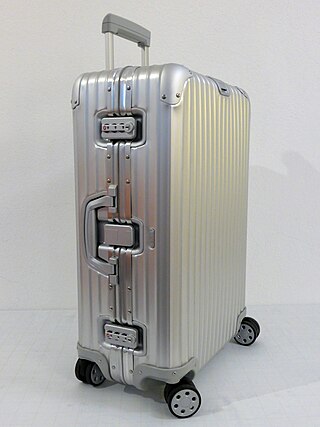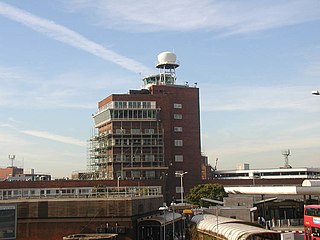
Ryanair Holdings PLC is an Irish ultra low-cost carrier group headquartered in Swords, Dublin, Ireland. The company includes the subsidiaries Ryanair DACTooltip Designated activity company, Malta Air, Buzz, Lauda Europe and Ryanair UK. Ryanair DAC, the oldest airline of the group, was founded in 1984. Ryanair Holdings was established in 1996 as a holding company for Ryanair with the two companies having the same board of directors and executive officers. In 2019 the transition began from the airline Ryanair and its subsidiaries into separate sister airlines under the holding company. Later in 2019 Malta Air joined Ryanair Holdings.

A low-cost carrier (LCC) or low-cost airline, also called no-frills, budget or discount carrier or airline, is an airline that is operated with an emphasis on minimizing operating costs. It sacrifices certain traditional airline luxuries, for cheaper fares. To make up for revenue lost in decreased ticket prices, the airline may charge extra fees such as for carry-on baggage. As of April 2020, the world's largest low-cost carrier is Southwest Airlines, which operates primarily in the United States, as well as in some surrounding areas.

Lost luggage is luggage conveyed by a public carrier such as an airline, seafaring cruise ship, shipping company, or railway which fails to arrive at the correct destination with the passenger. In the United States, an average of 1 in 150 people have their checked baggage misdirected or left behind each year.

In airport terminals, a baggage reclaim area is an area where arriving passengers claim checked-in baggage after disembarking from an airline flight. The alternative term baggage claim is used at airports in the US and some other airports internationally. Similar systems are also used at train stations served by companies that offer checked bags, such as Amtrak in the United States.

Baggage or luggage consists of bags, cases, and containers which hold a traveler's personal articles while the traveler is in transit. A modern traveler can be expected to have packages containing clothing, toiletries, small possessions, trip necessities. On the return trip, travelers may have souvenirs and gifts. For some people, luggage and the style thereof is representative of the owner's wealth and status. Luggage is constructed to protect the items during travel either with a hard shell or a durable soft material. Luggage often has internal subdivisions or sections to aid in securing items. Handles are typically provided to facilitate carrying, and some luggage may have wheels and/or telescoping handles or leashes to make moving them easier.

In the airline industry, a baggage handler is a person who loads and unloads baggage, and other cargo for transport via aircraft. With most airlines, the formal job title is "fleet service agent/clerk", though the position is commonly known amongst airline employees as a "ramp agent", due to the job's location on the airport ramp (tarmac).

The term hand luggage or cabin baggage refers to the type of luggage that passengers are allowed to carry along in the passenger compartment of a vehicle instead of a separate cargo compartment. Passengers are allowed to carry a limited number of smaller bags with them in the vehicle, which typically contain valuables and items needed during the journey. There is normally storage space provided for hand luggage, either under seating, or in overhead lockers. Trains usually have luggage racks above the seats and may also have luggage space between the backs of seats facing opposite directions, or in extra luggage racks, for example, at the ends of the carriage near the doors.

Bag tags, also known as baggage tags, baggage checks or luggage tickets, have traditionally been used by bus, train, and airline carriers to route checked luggage to its final destination. The passenger stub is typically handed to the passenger or attached to the ticket envelope:
- to aid the passenger in identifying their bag among similar bags at the destination baggage carousel;
- as proof—still requested at a few airports—that the passenger is not removing someone else's bag from the baggage reclaim hall; and
- as a means for the passenger and carrier to identify and trace a specific bag that has gone astray and was not delivered at the destination. The carriers' liability is restricted to published tariffs and international agreements.

Skybus Airlines Inc. was a privately held airline based in Columbus, Ohio, United States. It operated as an ultra low-cost carrier modeled after the European airline Ryanair, and aimed to be the least expensive airline in the United States. The business model was heavily reliant on flying routes where other airlines did not have direct flights, as Ryanair did in Europe, thus keeping competition to a minimum, and on flying into secondary airports, rather than heavily trafficked ones.

Point-to-point transit is a transportation system in which a plane, bus, or train travels directly to a destination, rather than going through a central hub. This differs from the spoke-hub distribution paradigm in which the transportation goes to a central location where passengers change to another train, bus, or plane to reach their destination.

The Air Passengers Rights Regulation 2004 is a regulation in EU law establishing common rules on compensation and assistance to passengers in the event of denied boarding, flight cancellations, or long delays of flights. It requires compensation of €250 to €600 depending on the flight distance for delays over of at least three hours, cancellations, or being denied boarding from overbooking. Delays shorter than three hours means no entitlement to any compensation of any kind even if the delay was classified as non-extraordinary. Airlines must provide refreshments and accommodation where appropriate. The Court of Justice of the European Union has interpreted passenger rights strictly, so that there are virtually no exceptions for airlines to evade their obligations for breach of contract.

The 2006 transatlantic aircraft plot was a terrorist plot to detonate liquid explosives, carried aboard airliners travelling from the United Kingdom to the United States and Canada, disguised as soft drinks. The plot was discovered by British Metropolitan police during an extensive surveillance operation. A number of security measures were taken in response to the 2006 transatlantic aircraft plot.

Airport check-in is the process whereby an airline approves airplane passengers to board an airplane for a flight. Airlines typically use service counters found at airports for this process, and the check-in is normally handled by an airline itself or a handling agent working on behalf of an airline. Passengers usually hand over any baggage that they do not wish or are not allowed to carry in the aircraft's cabin and receive a boarding pass before they can proceed to board their aircraft.

An airline ticket is a document or electronic record, issued by an airline or a travel agency, that confirms that an individual is entitled to a seat on a flight on an aircraft. The airline ticket may be one of two types: a paper ticket, which comprises coupons or vouchers; and an electronic ticket.

Premium economy class, also known by brand names which vary by company, is a travel class offered on many airlines. It is usually positioned between standard economy class and business class in terms of price, comfort, and available amenities. In 1991, EVA Air was the first to introduce Evergreen Class, becoming the first airline to offer this class of service. It was widely acknowledged that the premium economy class has become a standard reflection of what the Business Class was like several decades ago. In some countries, this class has emerged as a response from governments and companies requiring economy class for travel done by staff, while still getting some benefits like airport priority.

On the commercial transportation, mostly with airlines, the baggage allowance is the amount of checked baggage or hand/carry-on luggage the company will allow per passenger. There may be limits on the amount that is allowed free of charge, and hard limits on the amount that is allowed.
Ancillary revenue is revenue that is derived from goods or services other than a company's primary product offering. Examples include concessions at sporting events, baggage handling or seat selection revenue received by airlines, restaurant revenue received by hotel owners, and car-wash services sold by gas stations. Ancillary revenue may exceed primary revenues, leading to changes in business models.

NokScoot Airlines Company Limited was a Thailand-based low-cost airline, operating medium- to long-haul international services out of Bangkok's Don Mueang International Airport. On 26 June 2020, the airline ceased its operation and was liquidated as a result of the COVID-19 pandemic.
Cobalt Air was a Cypriot airline headquartered in Nicosia based out of Larnaca International Airport.

Basic economy class is a travel class offered by a number of airlines. The class has superseded economy class as the cheapest airfare option for passengers and generally comes with more restrictions when compared to standard economy fares. Restrictions vary between different airlines, but they generally include not allowing passengers to change or cancel tickets or select seats for free. They are seen as a strategy for market segmentation.


















